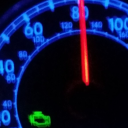I drive a small automatic car. For the most part, it struggles a bit with steep uphills, and picks up speed when going downhill. That’s to be expected.
But then I noticed some downhills actually slow it down. I’ve noticed during a two-hour motorway trip I often do to visit family, there are some specific downhills, not all, just some, where my car always slows down and I have no idea why.
Ideas?
This is very likely the reason. Not all downhills will induce it, but the automatic is down-shifting to slow your acceleration. There are various ways for your car to know but manufacturers want the driver in control, not the environment. Depending on the car and speed you may not hear it, but when it slows down does it sound like the engine is revving higher?
It also helps keep brakes cool, important for mountain driving.
One of my cars hardly does any automatic engine braking. My other vehicle will keep or decrease speed down long hills/mountains. No noticeable change in engine noise at all. Makes long trips through the mountains much easier, especially because it’s a heavy vehicle and overheated brakes is a very real concern.
What happens when the brakes get too hot? Do they gently stop working or can they just explode or something?
Generally much less effectiveness to almost none as they get hotter
Source: was an idiot teenager
Can you continue using them once they cool back down, or does the heating cause permanent damage?
At some point it probably does. And can probably catch fire. Mine were fine once they cooled
Thanks for the reply.
I was wondering if safety was like motorcycle helmets - I read that if you dropped them, like say, you kept them on the seat of your motorcycle and it fell off onto the ground, it’s no longer safe for use and needs to be replaced.
Brakes are assholes, when they overheat they can fail basically suddenly. You do get a warning in lower effectiveness or one side braking more than the other, but if you’re not familiar with that feeling, you may not realise it. Also modern cars are made so that everything just feels the same all the time.
You can see it in car races such as in F1. Braking braking, suddenly boom, car is in the barrier.
Yes, they’ll work again after cooling down unless they’re shit and got deformed, or you crashed.
That’s why it’s important to have brakes checked regularly, you get little to no warning in modern cars. Same with clutch and a bunch of other mechanisms.
Optical illusion is most likely the reason instead of engine brake if your vehicle slows down significantly in certain areas and doesn’t on other downhills with “similar” angle.
There is this slope near a waterfall around where I live. If you put your car in neutral gear at the bottom of the slope, it rolls “up” the hill. We named it magnetic hill back in high school, but I later found out that it is just an optical illusion that happens everywhere around the world. Basically some uphills look like downhills and vice versa. Google “gravity hill”.
Okay. I’ll fix a marked water bottle to the dashboard for the next trip, and see how the level stacks against the mark.
The water level will be affected by the car’s acceleration, which is likely also affecting your inner ear and causing the illusion in the first place.
You’ve crushed my hopes. There has to be a way that doesn’t require stopping the car
Is it a hybrid?
This matters. It might be charging the battery instead of engine breaking, with the same effect. That would be my guess.
Sounds like engine braking
How steep of a downhill and how fast are you going? Gravity will pull depending on the angle of the hill, wind resistance increases with the square of your speed. There will always be a speed where the force pulling you down/forwards will be the same as the force slowing you down due to wind resistance. If you go slower, your car will speed up towards that speed, if you are already faster, it will naturally slow down with no input from the engine or your brakes.
Well, it’s a 110km limit zone for the most part, I’m usually sitting somewhat under the limit but typically above 100. I don’t know how steep these slopes are. Maybe I’m under/overestimating them as a consequence of driving, slopes become obvious on foot. They don’t appear to be particularly steeper that others where my car doesn’t do this. They are certainly not very steep though, because there are a few of those and I gain and lose a lot of momentum on them.
Are you using cruise control to set the speed? If so, it could be engine braking to keep it at the desired speed. Some cars do this, some don’t.
No, no cruise control
Weird. If your RPMs increase during these slow downs then it’s from engine braking.
It could be that your car is downshifting for the uphill and then remains in that lower gear for the downhill, causing unintentional engine braking.
I’ve always assumed it’s something in the engine. But I also wonder if it’s some sort of friction based math? I have heard most cars are most fuel efficient at 55mph or so. My town has a large hill which my car can “coast” down with no gas required. However, like you, it stops increasing its speed around 55mph. It doesn’t seem to go any faster without me stepping on the gas. I don’t notice anything different about the car. It just seems to stop accelerating.
And if I hit the gas, it seems to re-settle back to 55mph.
I sometimes wonder if fuel efficiency being at 55mph is tied to friction of tires on asphalt. And maybe even on a steep hill, typical cars just cant overcome the kinetic friction to continue speeding up. Obviously the steepness of the hill matters, but roads have pretty stringent rules about grades. So we have an upper bound of what’s “reasonable” based on whatever the steepest allowable grade is.
I’ve also had this question. I’d love to know the answer!
It’s more to do with gearing and wind resistance.
Wind resistance increases dramatically as you go faster, (coefficient * frontal area) squared.
The rolling resistance from your tires is trivial in comparison.
Do you have cruise control set?
No









